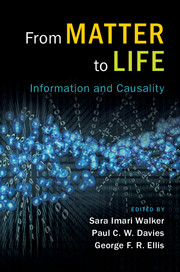Book contents
- Frontmatter
- Contents
- About the authors
- 1 Introduction
- Part I Physics and Life
- Part II Bio from Bit
- Part III Life's Hidden Information
- Part IV Complexity and Causality
- Part V From Matter to Mind
- 16 Major Transitions in Political Order
- 17 Bits from Brains: Analyzing Distributed Computation in Neural Systems
- 18 Machine Learning and the Questions It Raises
- Index
16 - Major Transitions in Political Order
from Part V - From Matter to Mind
Published online by Cambridge University Press: 02 March 2017
- Frontmatter
- Contents
- About the authors
- 1 Introduction
- Part I Physics and Life
- Part II Bio from Bit
- Part III Life's Hidden Information
- Part IV Complexity and Causality
- Part V From Matter to Mind
- 16 Major Transitions in Political Order
- 17 Bits from Brains: Analyzing Distributed Computation in Neural Systems
- 18 Machine Learning and the Questions It Raises
- Index
Summary
[T]hey then threw me upon the bed, and one of them (I think it was Mary Smith) kneeled on my breast, and with one hand held my throat; Mary Junque felt for my money; by my struggling about, they did not get it at that time; then they called another woman in … when she came in, they said cut him! cut him! – Evidence of Benjamin Leethorp in the trial of Mary Junque and Mary Smith for grand larceny, Old Bailey Criminal Court, London, England; April 4, 1779 (Hitchcock et al., 2012)
Unless we are historians, the eighteenth-century world of Junque, Smith, and Leethorp is almost impossible to imagine. In stealing from Leethorp, the two women put themselves at risk not only of imprisonment but of indentured servitude in the colonies and even death. Leethorp, for his part, began his evidence by explaining to the jury how he was seeking a brothel different from the one in which he was throttled, stripped, and robbed. Junque and Smith were without benefit of legal counsel, and Smith's witnesses, unaware of the trial date, did not appear. The court condemned them to branding and a year's imprisonment in less than 500 words. The indictment, formally for a nonviolent offense, was one of hundreds of its kind that decade marked by assault, knives, and (sometimes) freely-flowing blood.
In the risks they ran and the things they were ashamed of, the three are alien to us; in its casual violence, so was the society that enclosed them. Yet this world gradually, continually, evolved into one far less tolerant of violence and yet far more protective of an individual's rights – into the world, in other words, of most readers of this volume. How witnesses, victims, and defendants spoke about both facts and norms in the law courts of London shifted, decade by decade, over the course of one hundred and fifty years (Klingenstein et al., 2014). This shift in speech paralleled a similar decline in how people behaved toward each other, as the state came, increasingly, to enforce its monopoly on violence (Elias, 1982).
- Type
- Chapter
- Information
- From Matter to LifeInformation and Causality, pp. 393 - 428Publisher: Cambridge University PressPrint publication year: 2017
- 2
- Cited by



